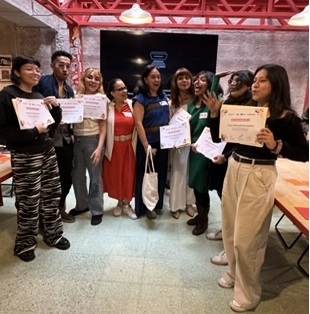By Monica Sofia Ramirez Garcia
GOYN CDMX Youth Advisory Group
The experience of caring from a young, collective and transformative perspective
The first time I heard the word "caregiving" was in my 20s, in college, in an economics class. Before that, I simply called it "taking responsibility for others." Since then, what I did in my family, with my siblings and my pets, finally had a name, an identity.
But then, what is care?
Caregiving is part of our daily lives: preparing meals, listening to someone in need, supporting others during illness, caring for children, the elderly, or people with disabilities, caring for the environment and our community. At first glance, these actions may seem small, almost automatic, but behind each of these gestures lies something much deeper: the very foundation of life.
Caring is not only a personal act; it is also a social and political act. Care makes it possible for society to function, for people to work, study, grow, and heal. Without care, there is no life possible.
And yet, everyday life often makes us forget its importance. Caregiving tasks have historically been made invisible and undervalued. In most cases, they have been assumed by women, without recognition or remuneration, thus reproducing inequalities based on gender, class, and other forms of exclusion.
To talk about care is to talk about shared responsibility: about the role that families, the State, communities, and also men play in sharing this task. Caring is not a favor or a natural vocation; it is essential work for collective well-being.
Revaluing care is a fundamental step toward a more just, equitable, and humane society.
Youth also care
Thinking about care from the perspective of youth opens the door to new ways of imagining the collective. At different times, in different realities, and in different spaces, young people participate, accompany, support, and create networks, often through sensitivity, empathy, and daily commitment.
Caregiving may not be named as such, but it's there: in those who help at home, care for sisters or brothers, accompany the elderly, participate in communities, or simply are there for others in important moments. It's also there when they challenge models that overburden some people and disempower others.
From this perspective, young people are not just recipients of care: they are also subjects of care, who consider the collective well-being, who build bonds of affection and solidarity. There is no single way to do this, nor a single path. But recognizing this possibility opens the way to imagining new forms of social organization, where care is shared, valued, and reimagined across generations.
Perhaps looking at care from a youth perspective invites us to transform our ideas about who cares, how we care, and what the point of caring is.
A forum to re-signify care
Thinking about all the intersecting and interwoven themes surrounding care, I became part of the forum "Young Voices in Care: Forum for the Right to Care," a space for dialogue, redefinition, visibility, and even protest from the voices of youth.
First, we begin with an internal dialogue in which we ask ourselves: What is caring? Who cares for you? Who do we care with? Who helps us care? I think it's important to mention these questions because everything starts there.
Starting with common questions helps us create a sense of belonging and identity, recognizing that what we thought was everyday is also political and collective, and therefore must be addressed from a community perspective.
From there, a more structured approach began: transforming our experiences into proposals for decision-makers. We had the opportunity to engage with institutional stakeholders in Mexico City, such as the representative of the Mayor, representatives of SECTEI, and the Youth Institute.
In this exchange, youth representatives proposed new starting points for public policies. For example, we expressed our concern about new forms of family: non-parental families that, because they are not formally recognized by the system, are often excluded from the right to care and be cared for. We integrated all of this into a proposal that places intersectionality as the basis for guaranteeing the right to care.
In addition, we had a panel in which institutional representatives shared the actions they are promoting to create, make visible, and promote care as the foundation of everything. Among them, they spoke about the Utopías project, spaces currently located in Iztapalapa with plans to expand to other municipalities. The goal is for all care workers to have access to facilities and services that promote both self-care and collective care.
These proposals, originating from the local government, seek to respond to an urgent need: to make care an accessible and guaranteed right for everyone, regardless of where they live or what group they belong to.
In this exchange, youth representatives also proposed new starting points for public policies. For example, we expressed our concern about new forms of family: non-parental families that, because they are not formally recognized by the system, are often excluded from the right to care and be cared for. We integrated all of this into a proposal that places intersectionality as the basis for guaranteeing the right to care.
All of these institutional proposals are truly valuable and motivating. They encourage us to continue this initiative, which seeks to raise awareness of care and place it at the center of public policy.
However, we as youth continue to believe it's essential to integrate more spaces for direct dialogue with young people, not just to talk about them, but with them. To listen to their voices, to understand where their concerns and needs come from.
We need to go beyond statistics and begin to put names to numbers, faces to data, and stories to graphs. Only then can we move toward more strategic, inclusive, and truly representative public policies.
Caring should not be a privilege or a burden: it should be a guaranteed right for all people, in all their forms and from all their realities. Young people, far from being absent from this conversation, are already caring, already proposing, already transforming.
Recognizing their voices opens the way to a more just future, where care is not invisible, but at the heart of social life.






